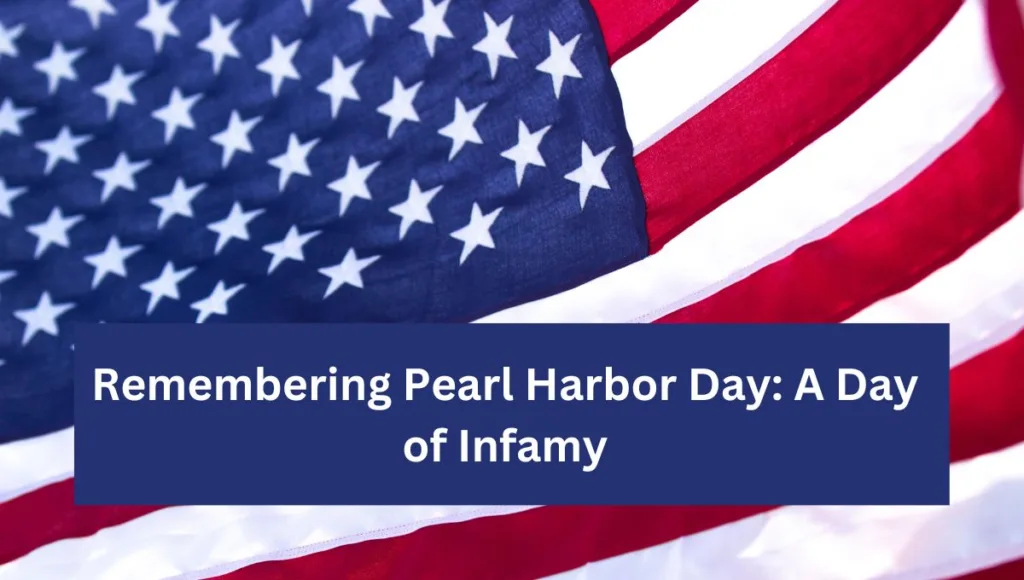Pearl Harbor Day (December 7, 1941): a date etched in the annals of American history as a day of infamy. It was on this day that the Japanese Imperial Navy launched a surprise attack on the United States naval base at Pearl Harbor, Hawaii, bringing the nation into World War II.
What Happened on the Day of the Pearl Harbor Attack
The attack on Pearl Harbor Day was a pivotal moment in world history. It marked the end of American isolationism and thrust the nation into the global conflict. The attack was meticulously planned and executed by the Japanese, who aimed to cripple the U.S. Pacific Fleet and prevent American interference in their expansionist plans in Southeast Asia.
What Events led to Pearl Harbor Day
- At 7:55 AM Hawaiian Standard Time, the first wave of Japanese aircraft, consisting of 353 fighters, bombers, and torpedo planes, launched from six aircraft carriers positioned north of Oahu.
- The unsuspecting American forces were caught completely by surprise. Battleships, including the USS Arizona and USS Utah, were bombed and sunk, while other ships and aircraft were severely damaged.
- The attack lasted for two hours, leaving behind a scene of utter devastation. 2,403 Americans were killed, 1,178 were wounded, and 18 naval vessels, including eight battleships, were sunk or severely damaged.
What Happened After the Pearl Harbor Attack
The United States was significantly impacted by the Pearl Harbor attack. The next day, President Franklin D. Roosevelt formally entered the United States of America into World War II by declaring war on Japan. Additionally, the strike strengthened American resolve and solidarity and resulted in a massive mobilization of personnel and resources for the war effort.
What was the Impact of Pearl Harbor attack
- It signaled the end of American isolationism: before the strike, the US had remained neutral in the international battle. But the attack on Pearl Harbor compelled the US to enter the war and give up its isolationist posture.
- The assault on Pearl Harbor united the American people and sparked a huge effort to mobilize resources and manpower for the war effort. This resulted in the mobilization of American resources and manpower. This covered citizen mobilization, military recruiting, and industrial production.
- The attack on Pearl Harbor had a significant influence on how World War II played out. It changed the trajectory of the conflict. It caused the war’s focus to change from Europe to the Pacific, resulting in a direct conflict between Japan and the United States.
- It serves as a vivid reminder of the brittleness of peace: the attack on Pearl Harbor highlights the fact that even the most powerful countries are susceptible to conflict and that peace is not always assured.
Pearl Harbor Remembrance Day
In the US, December 7th is recognized as National Pearl Harbor Remembrance Day. On this day, we pay tribute to the attack victims, recognize the valor of the military troops who protected the base, and consider the terrible consequences of war.
The world and the United States both greatly value the historical significance of Pearl Harbor Day. The transience of peace, the significance of national security, and the steadfastness of the American people are all brought to light by it.
Sources :
- https://en.wikipedia.org/wiki/Pearl_Harbor
- https://www.history.com/topics/world-war-ii/japanese-attack-pearl-harbor-video
- https://www.history.com/topics/world-war-ii/pearl-harbor
Conclusion
The attack on Pearl Harbor is a significant event in American history that continues to resonate today. It serves as a reminder of the importance of peace, the sacrifices made in times of war, and the enduring strength of the American people.
My name is Mohit sharma I am a Professional content writer having experience in Digital marketing. I write latest content related to Technology and business.




